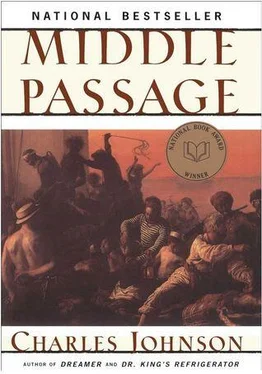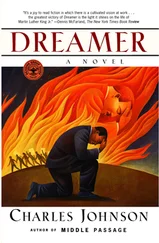Before I could rap on the door it sprang open. Santos had been eavesdropping at the porthole. He kept a distance of twelve feet between us as I entered; his eyes never left me when he slammed the door, turned the key in its latch, and retired to a corner opposite Papa, who was seated at a table with carved cabriole legs bolted to the floor. It came as no surprise that these accommodations contained all the comforts Papa enjoyed on shore. He did not travel without enough packages — dozens of shoes, two changes of clothing a day — to fill the hold of a merchantman, and these were cast about on ornate furniture, thrown over tripod tables, across a heavily cushioned sofa, and on his heavily draped bed, heaped into piles awaiting Santos, who would wash, press, and sort them the way my brother had served Reverend Chandler. Surprisingly, Papa apologized for this disorder, and then he took a cigar from a tortoise-shell box on the table and offered me one.
“Calhoun”—he leaned forward in his fruitwood chair to give me a light—“I won’t ask how you got on that ship if you don’t ask why I’m interested in its cargo.”
“The slaves, you mean?”
He straightened, as if I’d poked his spine. “It was a slaver? They’re illegal, aren’t they?” He pondered this, thumbing one of the straps to his suspenders. “How many slaves would you say it was carryin’ before that storm off the coast of Guadeloupe?”
“Fifteen,” I said. “Before the storm and after the mutiny.”
“Mutiny? By who — sailors or slaves?”
“Both, or I should say the ship’s crew was planning to set their captain adrift before the slaves broke free.”
“I see.” Papa ritched back in his chair, his mind racing ahead of me, judging by the evidence in his eyes, as chess masters leap two moves ahead of your own. “Then it was his fault, wasn’t it? Your captain? If there was — uh, an inquiry into all this, if Mr. Quackenbush was to file a report on the shipwreck from which you was saved, thank heaven, would you be prepared to, uh, testify before a maritime court that your captain, being mad, lost control of his vessel, and was maybe even unfit before the voyage began, that he, a barrator, added African slaves to a simple expedition intended only for the transport of butter, bullocks, and rice? Could you say that, Calhoun, if someone — a nameless benefactor, say — was to come up with the currency to reward you for such a tirin’ public speech?” While he talked I opened the logbook you presently hold in your hands. The smell of the sea came off these pages so strongly I had to blink away images of the ship’s sails and mainmast. Papa’s fingertips nervously drummed the edge of his table. “What’re you playin’ with there, boy?”
“Oh, dates,” I said. “Nothing important, just the ship’s manifest, with names for each Allmuseri slave on board, payment rates for the ship’s principal investors, including your whack, Papa.”
“Naw, I can’t be in that book.” He frowned and bent closer, trying to look, and swallowed. “Can I?”
I tilted the book so he could see. “Naval authorities will find this document very interesting. Captain Falcon’s logbook, I’m thinking, would be Exhibit A for any investigation into the loss of the Republic. On the other hand, it would be tragic, don’t you think, if it fell into the hands of William Lloyd Garrison. Or maybe the runaway slaves living among Indians, up in the mountains, who periodically raid plantations and, dear me, kill slave owners.”
“Santos,” barked Papa, “take that book from him!”
As with pain, so too did thought travel slow as slugs in winter through the inner wiring behind Santos’s brow. You may have noticed that he could not think and move at the same time. So he stood perfectly still, like statuary in the corner, and thought furiously, and finally brought out, “Papa, is he sayin’ you was dealin’ in slaves?” Big as he was, the man was preparing his face to cry over this betrayal. “What was that name you used, Calhoun? All — museri? My grand-daddy use to call hisself that.” He thumped a step toward Papa, his tread shaking the floor, then realized it was too hard to talk, think, and perambulate all at once, and stopped alongside me, his voice cracking and hands flat at his sides. “My people on my grandpa’s side is from that tribe.” He wanted to think again, thus was silent for two minutes as we patiently waited. “Calhoun, why would Papa do something like that.”
“Ask him,” I said.
“Papa?”
If anyone knew the untapped power in Santos’s top-heavy body, it was the man who had hired him. He never got sick, couldn’t get drunk, no matter how he tried, and had such a high tolerance of pain he often injured himself accidentally. With each step his man took, Papa backed toward the corner behind his table, and was now squeezing himself against it, as if literally trying to force his way through the wall into the next room. “All right, lissen. Let me put my cards on the table. I made a mistake. Anybody kin do that, right? At first I didn’t know that ship was carryin’ anything more’n vegetables and hides. You got my word on that. Zebediah Singleton come to New Orleans to play at one of my tables, and told me ’bout a business investment he said was straight-up legal — an opportunity for a cullud man closed out of the shippin’ industry. I thought it’d be a good thing for me’n my people, a chance to diversify, get a foot in the door, go up one more stairway into somethin’ legitimate instead of bein’ stuck in the kinda business — gamblin’ and gun-runnin’—I been limited to all my life.” Papa’s scalp was rivering a screen of perspiration over his brow, causing him to rub both palms over his eyes. “I didn’t mean no harm. But once I got in that was it. You kin see what I’m sayin’, can’t you? Sometimes the biggest curse in the world kin be getting exactly what you want, or think you want, ’cause there’s no way to see all the sides when you sign your name or give a handshake. You don’t always know what yo’ business partners are doin’, if they plan to cut yo’ throat, or use yo’ money — unbeknownst to you — for purposes that’ll make you wish you was dead. Calhoun, if I’d known up front the real freight we was smugglin’, I wouldn’ta had anythin’ to do with it.”
“I don’t believe you, Papa.” I turned, pitching my voice toward Santos. “And the Africans who survived this business venture of yours won’t either. They only number three, all children ranging in age from eight to eleven. As cute as they can be too, like Santos here. You could ease your conscience a little, I guess, if you provided something for them — a full endowment, say, for each — until they come of age.”
Santos said, “Damn right.”
“Done!” The muscles in Papa’s face fell loose, hanging in folds. “And you’re gonna destroy that book, ain’tcha?”
“I’d rather keep it as insurance.” I did not want to hear any more. Possibly, he was lying to me about his involvement in the slave trade. Possibly, he still had deep pockets and a web of criminal connections in Louisiana and planned to have me and the logbook conveniently disappear once we were on shore (I decided it would be best for me to return to southern Illinois); but possibly, too, his equating of personal freedom and racial pride with fantastic wealth and power had gotten the blighter in over his head. Needless to say, I had little sympathy for him. I wanted to give him a good drubbing, but I felt too weakened after learning that Santos might be Baleka’s distant cousin, and that meant he might be my in-law and come to visit for family reunions. Santos, though, who knew nothing of these backroom dealings, seemed eager to volunteer for the chore. “You bought slaves, Papa? After all I told you ’bout how Ruffner treated me, you did that?” I had to stick out my cane, like a tree limb, to keep him on our side of the table. But yes, it felt good to have his 280 pounds on my side for a change.
Читать дальше












